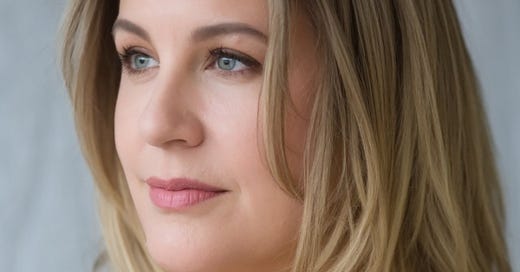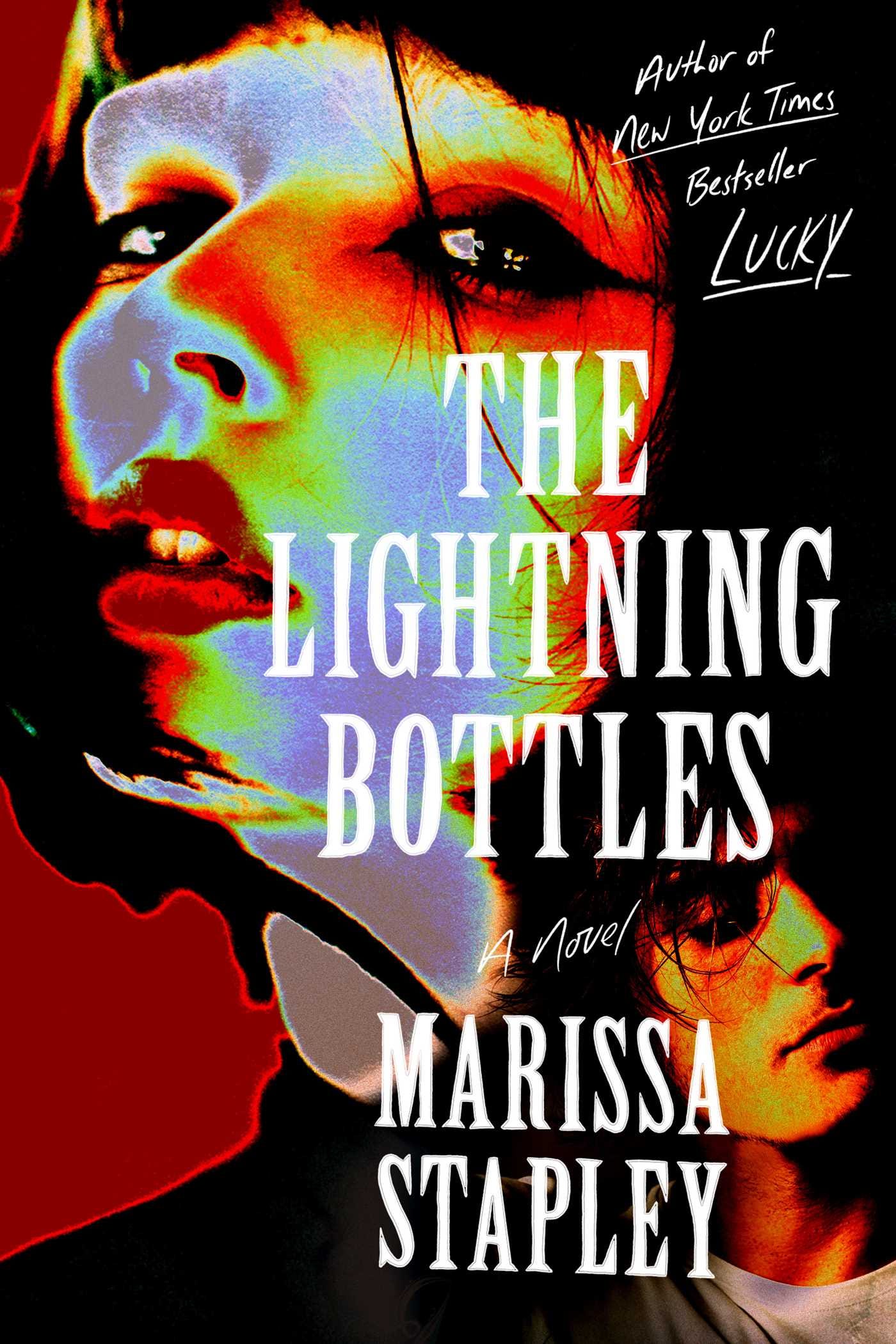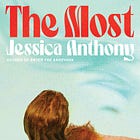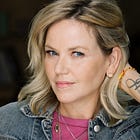CR 019: Marissa Stapley on Writing, Rock Stars, and Rom-Coms
The New York Times bestselling author discusses her new novel, “The Lightning Bottles,” and writing rom-coms under the pen name Julia McKay.
Marissa Stapley always knew she wanted to write a novel set in the ’90s-era alt-rock music scene. Growing up, Stapley was a superfan of Sinéad O’Connor, Hole, and Nirvana, while everyone else in her small town, she says, “was listening to country music and driving pickup trucks.” In 2014, Simon & Schuster published her debut novel, Mating for Life, which follows an aging folk singer, Helen Sear, as she grapples with her identity as a wife and mother. Additional books followed, including 2021’s Lucky, which was selected as a Reese Witherspoon Book Club pick and went on to become a New York Times bestseller.
But it was The Lightning Bottles, a story about love, fame, and destruction steeped in ’90s music, that Stapley continued to return to. “The idea came to me six years ago,” she says. “I started it, and I didn’t realize at the time I was just getting to the heart of these characters. I wrote almost an entire novel in letters and journal entries and sent it to my agent, and she was like, ‘This is great, but it’s very epistolary. Maybe this isn’t the approach.’”
When her mother fell ill, Stapley put the novel aside because, she says, “there was something so dark and difficult about it.” It was only after her mother passed away that she was able to return to the story. “I worked on Lucky, and all this exciting stuff ended up happening. Then I went back to The Lightning Bottles, having lost someone. And unfortunately, now I get it. Now I understand. Because that idea of what you wouldn’t do to get that person back—I fully understand that now. So, it’s the book I always wanted to write.”
The novel tells the story of Jane and Elijah, two teens who develop an intense bond over their shared love of music and their desire to escape the lives into which they were born. The duo forms a band, the Lightning Bottles, which takes the world by storm. And yet, despite her songwriting contributions, Jane is seen as nothing more than a hanger-on and hindrance to Elijah’s talent. When Elijah vanishes at the height of the band’s fame and is presumed dead, Jane becomes the most hated woman in the industry and finds it impossible to leave her past behind her. Things take an even more complicated turn when a Lightning Bottles fan approaches Jane years after Elijah’s disappearance and says she’s found clues indicating that he might still be alive. An engrossing page-turner, The Lightning Bottles takes readers back and forth in time to follow the pair’s ascent to stardom, their fall from grace, and Jane’s pursuit of the truth.
Over a Zoom call, I chatted with Stapley about the music of our youth, the act of incorporating real-world events into fiction, and why she writes rom-coms under a pen name.
This content contains affiliate links. I am an affiliate of Bookshop.org and I will earn a commission if you click through and make a purchase.
For those of us of a certain age, The Lightning Bottles is an incredible blast from the past, and it’s obvious you’re a fan of music from that time. How much of yourself and your own life did you pull from when writing this book? Did you keep journals back then? Did you pull from actual experiences or thoughts that you had?
Yeah, somewhat terrifyingly, I kept a day-to-day, really detailed journal from 15 to 17. I even wrote in it, “I wonder if I’ll have a daughter someday and she’ll read this.” Are you crazy? I’m gonna need to burn these. [Laughs] But it was a real gift when I was doing research. I did so much research of music memoirs—it could reach the ceiling with how many books I read—but that excavation of my own personal account of being a teenager and loving music the way I did was so special to have. I used to write a lot of poetry back then, too, so when it came time to write the lyrics [for the band in the book], I used some of that. I’ve gotten a lot of compliments on those lyrics, and I think what is special about them is that they are written by a younger person who feels those feelings. I don’t know that at 45 if I could have written stuff like that. The seeds of it really were in my teenage self, so it was great. I’m glad I kept all that stuff.
The book is dedicated to many female musicians of the time—“Courtney, Delores, Donita, Fiona, Juliana, Katherine, the Kims, Liz, PJ, Shirley, Sinéad, Tori.” What impact did these women have on your younger self?
I look at the alternative and grunge music scene from two angles. There’s the retrospective angle, where it looks like there weren’t any women. And then when I look at my CD collection, what I was listening to, who was speaking to me, it was the female artist. Sure, I liked Nirvana. Of course I did. And Pearl Jam. But the albums that I would put on and listen to on repeat, it was always Hole and Tori Amos, and I loved Juliana Hatfield and Fiona Apple and Liz Phair and Babes in Toyland and Lush. They, to me, were front and center, but for whatever reason, they’re not front and center now when we look back on it, and that’s a real piss off. [Laughs] So that’s why I dedicate it to them. And also, it’s Jane Pyre’s story. Elijah is very purposeful that he doesn’t get his own chapters. He’s there, but it is not his story. It’s her journey.
The story is a mystery. We’re following Jane back and forth in time and trying to figure out what happened to Elijah. But it also is very much about how women are treated in the industry and how they are perceived by the public. Was this something you knew going in that you wanted to write about? Or did you start with the mystery and then let this aspect of the book form?
You have to be careful. As an author, whenever I feel I have a message, alarm bells go off. Because then it’s suddenly like everyone’s eating broccoli. [Laughs] Yes, I wanted to do that. I knew I needed to find a really good story to almost trick the readers into eating the broccoli. Sometimes I come up with a situation. Like [with] Lucky, I heard a radio report about a lottery ticket that was going unclaimed, and they thought maybe the person who had it was wanted and couldn’t cash it in. And I was like, that’s a great situation. Now I need a character. And in some ways, that’s actually easier, because the character eventually comes to you. It’s almost like they apply for the job and they’re like, “I can fit into this great situation.” Jane and Elijah were with me, and I knew them. And when you know too much about people, it’s hard to drill down what’s important about them. So eventually I had to figure out a situation for them that was more than just “these people are really messed up by fame.” So that’s where the mystery element came in. That’s when I could really start writing the book, as opposed to what I had [already written], which was letters and poems and memoir excerpts and all the [epistolary] stuff that I had.
One of the characters in this book is Helen Sear, who was the protagonist of your debut novel. Is that something you want to do more of, let characters pop in and out of each other’s stories?
Yeah, I’ve never done that before. You’re the first person who noticed. Even one of my editors was like, “There’s a Helen Sear in the U.K. who’s a sculptor. Maybe you want to change the name.” And I was like, “Well, I can’t change the name because she’s from my first novel.”
I write holiday rom-coms on the side under a pseudonym. More of that happens in the rom-com world. Mating for Life and The Lightning Bottles are the books of my heart. They’re so special. And Helen’s a musician, so it was a natural thing to bring her in.
There are facts woven into the fiction. For example, you have an Irish singer, clearly modeled after Sinéad O’Connor, who rips up a photo during a television appearance and later is booed off the stage at a concert. Did you intend, going into the writing process, to base aspects of this book on factual events of the time?
I really leaned in some drafts to the factual elements, and then realized I’m creating a fictional world here, so I can play with the details. It first occurred to me when I was trying to use real Cure lyrics and one of my editors was like, “It’s so hard to get permission to use lyrics. Why don’t you just make up bands? This is your world. Make stuff up.” So I wrote that scene and put Sinéad and Jane together, and it really was Sinéad. But then I decided to make it a composite, because I was playing with the fact that Jane was there, so I might as well. I also think Sinéad was still alive when I was writing it and I thought, “I’ll just give her the respect of not actually sticking her in my book.” I was hoping she’d read The Lightning Bottles and that it would make her feel better. I was devastated [when she died], which also made me consider fandom. I never met Sinéad O’Connor, but she was a part of my life, and so I grieved her and the lost opportunity to share my art with her, which would have been such a fan fantasy come true.
What is your writing process like? When you’re starting a novel, how much do you plot out? Do you know how the book is going to end?
I used to be a real pantser, as they say. And I taught writing courses where I’d be like, “Here’s how you do it.” Which, by the way, there are many ways to write. If you feel you need to take a course, go ahead, but the person’s just telling you the one way to do it that’s working for them.
I used to feel my way through a really lean first draft, like 40,000 words, and then go back and outline and add the missing pieces. That’s fine. It’s fun to do it that way. But this is a job for me now. It’s a big job, and I’m writing in different streams, and also, I’m in the well-earned position of being able to sell my work on proposals, so I need to outline now. So, I have an outline. Generally I know where I’m going. But also, I do think that at least you need to know, in order to determine whether or not a book has legs and you can pursue it, where you’re going to end up. I think that’s important. There has to be a feasible ending. I’ve done a few drafts of books where I’m like, “I’m just going to figure this out,” and then I’m like, “There’s no figuring this out. There’s nowhere for these great characters to go.” Or maybe it’s not that there’s nowhere for them to go, but you don’t want to go there, which I had a few moments of with Jane and Elijah.
It gets really dark with the drug use [in The Lightning Bottles] and I tried to get out of it. I tried so hard to wriggle my way out of it with my editors. I’m like, “Maybe he’s just an alcoholic or taking some pills.” And they’re like, “He’s doing heroin. Obviously, that’s what’s happening.” And I didn’t want to go there. My mother-in-law was over for dinner the other day, and she was like, “Wow. I know you did a lot of research, because you don’t know about that.” [Laughs] I definitely have never done heroin. But yeah, you just have to decide. You figure out where they’re going and if you want to go there with them. And now I do that because it’s too risky for me to chase waterfalls.
You mentioned that you did a lot of reading as you were working on this book. What were some of the books that were influential as you were working on this particular project?
Dave Lory, who used to be Jeff Buckley’s manager, wrote a really good memoir [Jeff Buckley: From Hallelujah to the Last Goodbye] about his time with him that I relied on. And then, oh gosh, any memoir, like Cyndi Lauper’s memoir or Sinéad O’Connor’s Rememberings. All of those, just to get inside of the heads of musicians and how it feels to be a musician. There was a book by Meredith Ochs called Rock-and-Roll Woman and that was huge, because it’s the deep cuts and untold stories of female musicians. There’s 50 of them in this book. And you read stories of stuff you may not have known about Stevie Nicks or Debbie Harry. Not just the stuff that was told about them, which was such ’90s b.s., like Fiona Apple was too skinny and Liz Phair was kind of slutty, but who they really were, what they went through. That was extremely helpful.
You mentioned this before, but in addition to the novels under your own name, you’ve written rom-coms under the pen names Julia McKay and Maggie Knox. Why use other names for certain books?
The reason for that is, in part, because of contract stuff. When you have a contract with a publisher, they have first right of refusal on your next novel under your name. So a publisher like Simon & Schuster, who’s publishing The Lightning Bottles, are going to want something in a similar vein. And if the next Marissa Stapley novel is a holiday rom-com, they have to refuse it and then we’re out of our contract. And I don’t ever want to do that to anyone. Then there’s also brand confusion. I don’t necessarily want the holiday rom-coms to be out under my name when I have these very different novels. I’m not hiding. I’m hiding in plain sight with Julia McKay, and everyone knows it’s me, but these are different.
People are always like, “Why do you do this [the rom-coms]?” I do it because I do go to some dark places with my other novels, and it’s challenging. Emily Henry talks about that hope that romance authors offer their readers in a dark world. You could still go to some dark places, but you’re guaranteeing a happy ending. I think that’s so beautiful. The rom-coms are tremendously difficult to write. Easy reading is very hard writing. I think Nathaniel Hawthorne said that, and it really bugs me when people are like, “This was an easy read.” I’m like, “Yeah? Well, try doing that.”
You also collaborated on a book, Three Holidays and a Wedding, with another author, Uzma Jalaluddin. What is the writing process like when there are two of you working together?
I really miss it, actually, because now I’m doing the Julia McKay novels by myself, just because my schedule is too hard to collaborate with someone else. I miss that collaborative feel, because writing is a very isolating job. I’m going to be out there promoting The Lightning Bottles, and I’m having a launch party, and all my friends will be there, and it’s so exciting, and it feeds me so much. But [when I’m writing] I’m by myself with my butt in a chair. That’s what writing is. You get feedback from your editors, and they’re not your best friend. They don’t love you. It’s a beautiful relationship, but it’s very high-stakes professional. So writing with another author, particularly with Uzma, was just so great. You’re in a Google Doc with someone, and you’re passing stuff back and forth. I really loved that experience. I’ve been fantasizing about doing it again, because it’s lonely.
What advice would you give to aspiring authors?
I wish that someone had told me this earlier in my career: A publicist was like, “This is a marathon, not a race.” And I was like, “Oh shit. I have been really sprinting.” And it is a marathon. There are goalposts and they’re constantly moving. I’m never going to get to a place where I’m like, “I’m going to rest on my laurels now,” because you’re only as good as your next novel, and every goal unlocked creates a whole other host of goals that you have to meet, particularly when you’re sharing your work with the world. You have to stay strong and realize that if you’re truly going to do this, you have to be in it for the long haul. Take care of yourself. Slow down when you need to and speed up when you need to and be good to yourself.
To learn more about Marissa Stapley, visit her website.
To purchase The Lightning Bottles, click here.
This interview has been edited for clarity and length.
You might also enjoy…










Such a good one! Made me want to buy it! I love that she tackled that time period in music.